Oil Palm Subsidies: Cronyism, Emissions, Deforestation
Businesses are benefiting from oil palm subsidies. At the same time, oil palm farmers are mired in debts, forests keep on disappearing, and emissions continue to rise.
Erwan Hermawan
April 11, 2022
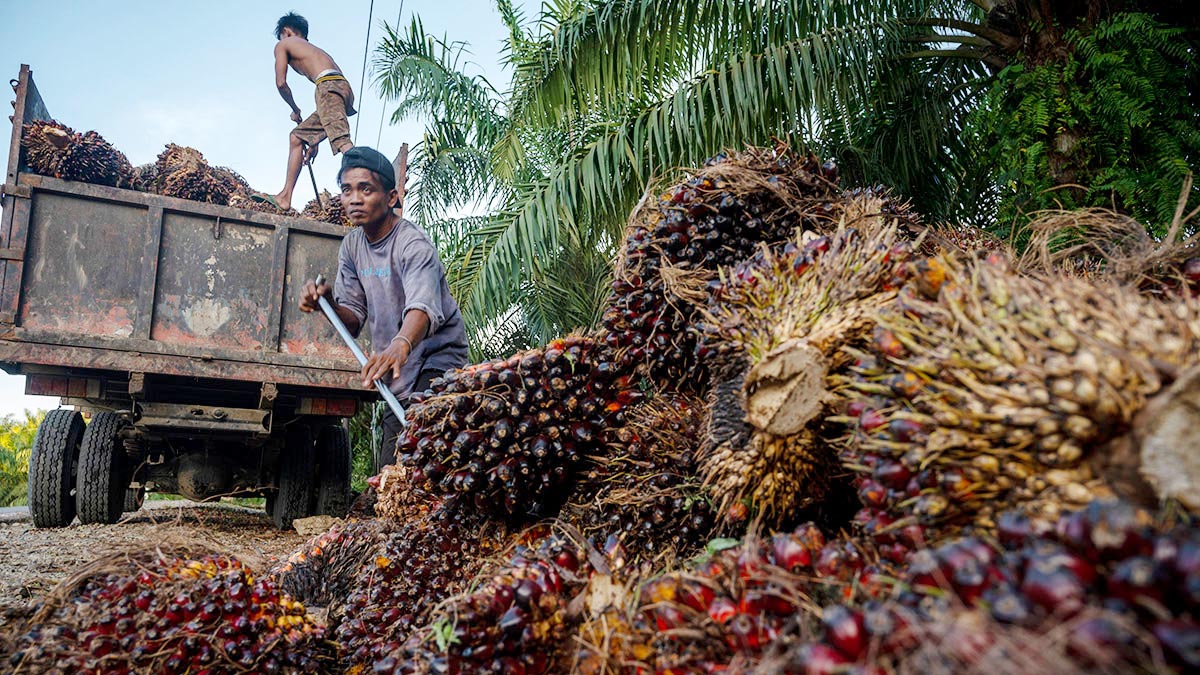
ON February 24, the Oil Palm Plantation Fund Management Agency (BPDPKS) held an event in Libo Jaya village to inform the village community about the oil palm rejuvenation program. As chairperson of the steering committee, Coordinating Minister for the Economy Airlangga Hartarto visited the village located in Siak, Riau. Around 300 oil palm farmers attended the event dubbed the “First Planting in the Strategic Partnership Oil Palm Rejuvenation Program,” sponsored by Sinar Mas and BRI.
Tolen Ketaren did not let the opportunity fly by. The general chairperson of the Sawitku Masa Depanku (Samade) Association needed a central government official to sit on the governing board of the organization that oversees 14,000 oil palm farmers in Riau. He had been lobbying to have Airlangga sit on the board for one year. “We indeed asked him,” said Tolen on Monday, April 4.
In September 2021, he visited Airlangga’s office on the third floor of the Ali Wardhana Building in Jalan Lapangan Banteng, Central Jakarta. Foreign Minister Retno P. Marsudi was also present. But how did Tolen manage to meet with these Indonesian high-ranking officials? “With the help of Pak Tumanggor,” said Tolen, referring to Master Parulian Tumanggor.
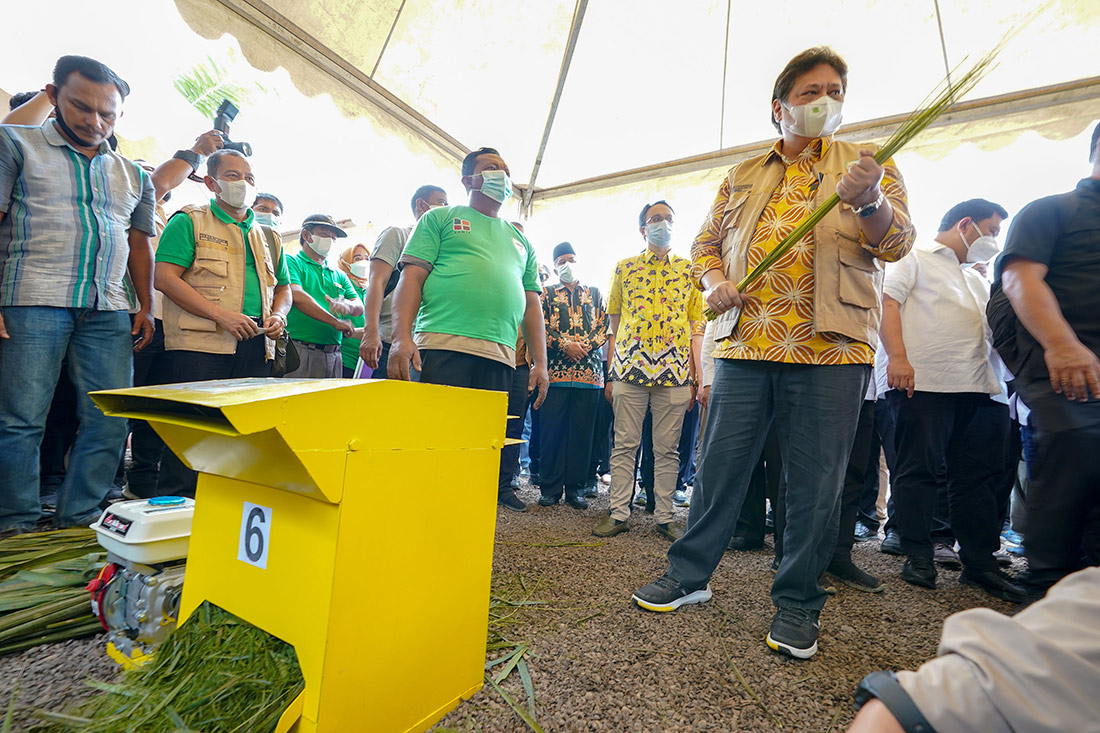
Coordinating Minister for the Economy Airlangga Hartarto inspects an exhibition booth after the Initial Planting of the People’s Oil Palm Rejuvenation Program in Parit Gajah village, Siak Regency, Riau, in February. ANTARA/Rony Muharrman
M.P. Tumanggor is the President Commissioner of Wilmar Nabati Indonesia and former regent of Dairi, North Sumatra, in 1999-2009. He is also the general chairperson of the Indonesian Biodiesel Producers Association (Aprobi). Because of his position and standing, Tumanggor frequently attends meetings to discuss biodiesel—a palm oil derivative—with the government. “I didn’t have direct access to Mr. Minister,” said Tolen.
Airlangga Hartarto finally agreed to chair Samade’s governing board and was officially inaugurated during the event in Libo Jaya village. Tolen Ketaren stood next to Airlangga while holding the organization’s banner, accompanied by other Samade officials. Airlangga’s Instagram account posted photos of the occasion several minutes after the event concluded.
The event was widely discussed by the mass media because oil farmers made a statement that they would support extending the President’s tenure and postponing the general elections. There is suspicion that Airlangga was using these oil palm farmers to demonstrate his loyalty to President Joko Widodo. “It was the aspiration of the farmers, who have benefited from oil palm prices,” Tolen clarified.
To Samade, Airlangga’s presence carried a certain prestige because he is also chairperson of BPDPKS’s steering committee. After all, the BPDPKS is the institution that provides oil palm rejuvenation subsidy for farmers. BPDPKS steering committee’s authority spans wide. With seven ministers as members, Airlangga has the authority to name resource persons in meetings to determine the value of subsidies for oil palm farmers as well as biodiesel.
The steering committee controls all six of BPDPKS’s duties. Even in determining biodiesel subsidy conversion factor, which should be the authority of the ministry of energy and mineral resources, the committee’s meetings have the last word. The problem is, Airlangga involved oil palm businesses by appointing five people as resource persons to inform decisions made by the steering committee.
Through the Coordinating Minister for the Economy Decree No. 134/2020 issued on March 2, 2020, Airlangga appointed five oil palm businessmen: Arif P. Rachmat, son of former Astra Chief Executive Officer (CEO), T.P. Rachmat, who founded Triputra Agro Persada; Franky Oesman Widjaya, son of Eka Tjipta Widjaja, who leads the Sinar Mas Group; Martias Fangiono, or Pung Kian Hwa, from the Surya Dumai Group; Martua Sitorus, founder of the Wilmar Group; and the secretary-general of the Indonesian Oil Palm Farmers Association (Apkasindo).
And how does Tumanggor fit in? Despite not being one of the people appointed by Airlangga, he claims to have often been invited in meetings to discuss biodiesel as Aprobi chairman. Tumanggor says he has been invited to these meetings since the BPDPKS was founded in 2015 by then-Coordinating Minister for the Economy Sofyan Djalil.
According to Oil Palm Farmers Union Secretary-General Mansuetus Darto the presence of oil palm businessmen as resource persons for the steering committee has created a disparity between subsidies for farmers and major industries. “It’s a conflict of interest,” he said on April 7. “Businesses want to continue to make profit.”
Data on BPDPKS subsidies in 2015-2021 confirms Darto’s concern. Almost 80 percent of the funds managed by the BPDPKS, in the amount of Rp139.2 trillion (US$ 9,6 billion), were channeled to oil palm businesses through biodiesel subsidy. In reality, BPDPKS’s main duty is to improve oil palm management, such as by advancing human resources, research, promoting plantations, rejuvenating plantations, as well as building facilities and infrastructures. Providing biodiesel is only one of the institution’s final duties.
The BPDPKS was founded in June 2015, when the price of Indonesian crude palm oil (CPO) plummeted in the global market. At the time, Indonesia was producing 32 million tons of palm oil, which the market could not fully absorb. As a result, there was an over-supply and the price dropped. The price of CPO, which exceeded US$1,200 per ton in 2012 continued to drop until it reached US$600 in 2015.
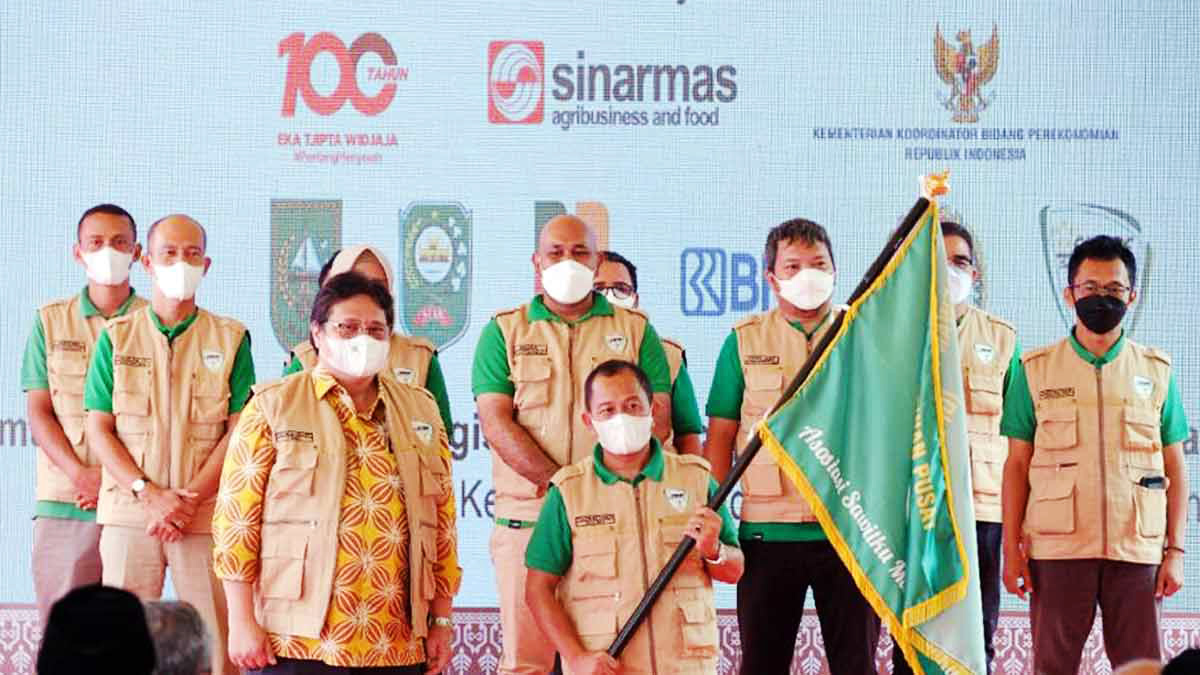
Coordinating Minister for the Economy Airlangga Hartarto (front, left) when appointed as Chairman of the Samade’s Board of Trustees in Libo Jaya village, Riau, February 24. KLIP Bureau of Coordinating Ministry for the Economy
Minister Sofyan Djalil had the idea to create demand inside the country by integrating the promise to reduce carbon emissions as promised in the Paris Agreement—a climate conference held in 2015. Sofyan wanted to reduce emissions by combining biodiesel and diesel fuel to power industries.
Because of the affirmative policy, demand for palm oil rose and the its price followed suit. The oil palm industry was even able to freely expand their plantations. A study by David L.A. Gaveau from TheTreeMap, France, which was published in Plos One, March 29, found that the expansion of oil palm plantations reached its peak in 2016, with almost 800,000 hectares added.
In the year when forest fires around oil palm concession areas contributed the highest amount of carbon emission, CPO price rose by US$100 per ton. According to Gaveau, the area of forest cover lost due to the expansion of oil palm plantations caused by CPO’s prices in 2015-2019 came to 400,000 hectares. In terms of carbon emissions, these deforestations released around 50 million tons of carbon dioxide (CO2) equivalent.
The problem is, how does the government provide biodiesel while making it seems that they are making an effort to reduce emission? According to Minister Sofyan, in the 16 meetings between the government and the oil palm industry before the BPDPKS was established, there was an agreement to push oil palm companies to be willing to produce biodiesel, namely, by giving them subsidies. Oil palm companies agreed to have the subsidy’s funding taken from an export levy for each ton of CPO. The levy would depend on the price of CPO. This year, for example, palm oil export levy is US$375, higher than last year in line with the increased price of CPO of US$1,200.
This is the short story of BPDPKS: the institution charges a palm oil export levy then distributes the fund according to the institution’s six duties as outlined under Presidential Regulation No. 66/2018. How the fund is allocated is determined in steering committee meetings. But, as Mansuetus Darto suspects, there has been an imbalance in how the fund has been allocated, with oil palm businesses advantaged over BPDPKS’s other duties and functions.
Darto’s complaint is reasonable. Wilmar Group has been benefiting most from the 80-percent biodiesel subsidy. In January to September 2016, for instance, Wilmar received a subsidy of Rp4.17 trillion (US$ 287,6 million). The business group made Rp2.85 trillion (US$ 196,5 million) in profit because it only paid Rp1.32 trillion (US$ 91,1 million) in CPO export levy. Compare this number with the subsidy for farmers in 2016, which only came to Rp6.59 trillion (US$ 454,5 million).
According to M.P. Tumanggor, the amount of subsidy received by a company depends on the volume of fatty acid methyl ester, or FAME, in their CPO. FAME is a final CPO product and a biodiesel ingredient. Wilmar, which had 232,053 hectares of oil palm plantations in 2020, has always deposited FAME in large amounts. Over six years, the group has submitted 9.75 million liters of palm oil, more than other business groups.
The subsidy’s amount is determined based on the difference between the market index prices for biodiesel and diesel fuel. The formula for biodiesel’s market index price is (CPO price + conversion factor) x (870 kilograms per cubic meter + transportation cost), while 870 refers to number for converting from kilogram to liter. According to Presidential Regulation No. 66, transportation costs and conversion factors are determined by the ministry of energy and mineral resources.
Dadan Kusdiana, Energy Ministry’s Director-General of New and Renewable Energy and Energy Conservation, confirmed that his ministry indeed determines the conversion factor. But the amount is often intervened by businesses. In 2020, for example, Aprobi recommended a conversion factor of US$100 per ton of CPO. “We wanted US$80,” said Dadan.
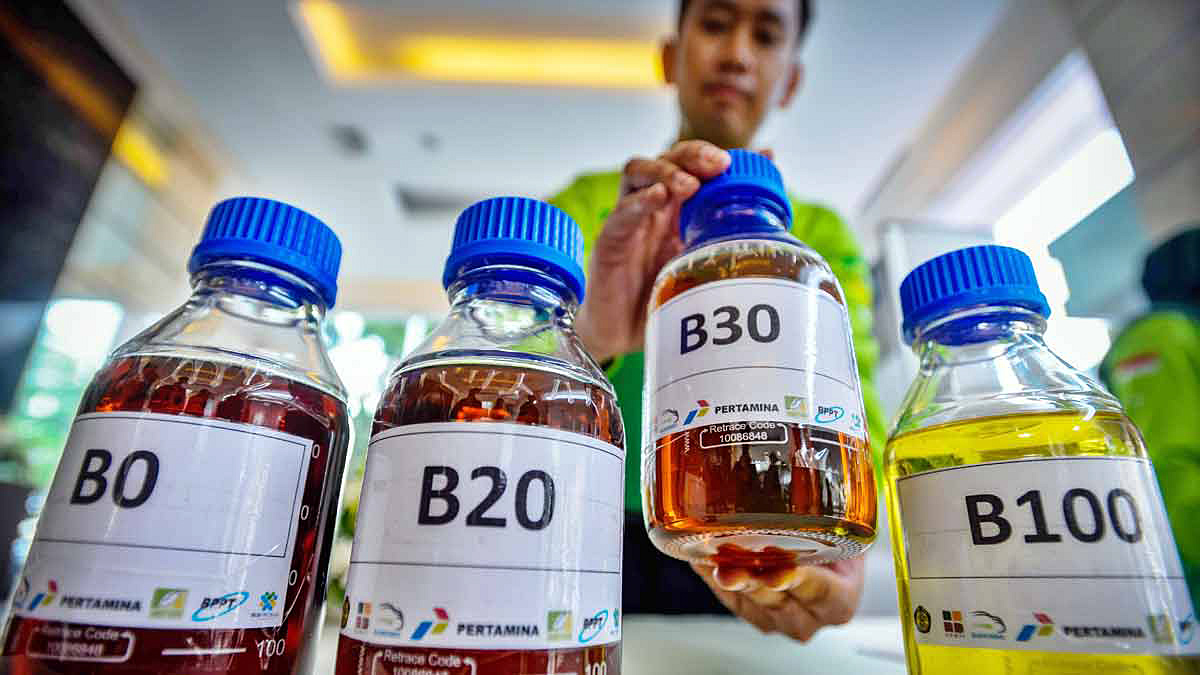
The launching of biodiesel mixed with oil palm derivative products at the ministry of energy and mineral resources, Jakarta, June 2019. TEMPO/Tony Hartawan
Because of the Covid-19 pandemic, businesses relented and were willing to lower the CPO conversion factor to match the government’s wish. The agreement was issued under Minister of Energy and Mineral Resources Decree No. 105K in June 2020. Four months later, Aprobi recommended using the old tariff of US$100 again. “Aprobi screamed and then it’s decided on US$85,” said Dadan.
The agreement, said Dadan, was decided in a BPDPKS steering committee meeting. According to Presidential Regulation No. 66/2018, the steering committee should only be drafting policies and monitoring their implementation. But, in reality, the conversion factor was also discussed in the meeting. “We said 100, but the steering committee refused. What about 95? This is more or less what happened,” Dadan added.
Dadan’s story confirms Mansuetus Darto’s concern that there has been a conflict of interest in determining biodiesel subsidy for oil palm businesses. Dadan does not deny the conflict of interest because of the presence of businesspeople in steering committee meetings.
According to him, businesses have the interest to suppress the palm oil export levy as much as possible. But they recommend the highest conversion factor for biodiesel in order to receive great subsidy. To Dadan, everyone on the steering committee has his or her own interest, including himself as a representative of the energy ministry, to ensure that there is a supply of biodiesel. “The conflict of interest is minimized by having many groups involved and by making decisions together,” he said.
Unlike Dadan Kusdiana, M.P. Tumanggor said that the market index price is fully determined by the energy ministry as well as the Research and Development Center for Oil and Gas (Lemigas), occasionally with the assistance of the Bandung Institute of Technology (ITB) as well as the research and technology ministry, and not the steering committee. “Pak Martias and Pak Franky Widjaja are the ones who frequently attend these meetings,” he said.
Franky Widjaja has not responded to Tempo’s questions sent to the Sinarmas Group at the Sinarmas Land Plaza, Jakarta. Meanwhile, Martias Fangiono claimed he was overseas. “I will be home in a week,” he said in a WhatsApp text on Tuesday, April 5. He promised to explain his involvement in determining biodiesel subsidy with the BPDPKS steering committee.
The Corruption Eradication Committee (KPK) has noted the conversion factor issue. According to the KPK, a conversion factor of US$85 per ton can potentially cause Rp4.2 trillion in state losses. Based on the KPK’s calculation, the ideal and mutually beneficial conversion factor comes to only US$77.31 per ton of CPO.
The problem is, the conversion factor of US$85 per ton is already the lowest figure. Every year, the conversion factor averages at US$100 per ton, and even reached US$125 in 2016. With the fluctuating biodiesel conversion factors and market index prices, the KPK believes that the steering committee has not determined these figures based on factual field data.
Unfortunately, Airlangga Hartarto did not respond to the request to confirm how market index prices—which dictate biodiesel subsidies—are determined. He refused to answer our interview request letter, even when Tempo visited him at his office on April 6-7. But, according to Dadan Kusdiana, biodiesel market index prices are calculated based on assessments by the University of Indonesia (UI). The university is consulted whenever the steering committee is about to determine subsidy values.
Another determining factor for biodiesel subsidy is transportation cost, whose value is determined by the energy minister. Yet, in the Energy Minister Decree No. 182K/2020, there is a difference in transportation tariffs in the same route, namely, Surabaya-Gresik in East Java. Pertamina and Wilmar’s transportation tariff is Rp130 per liter, while AKR Corporindo and Batara Elok Semesta Terpadu has a transportation tariff of Rp70 per liter.
On the Merak-Bekasi/Marunda route, transportation comes to Rp260 per liter. But according to the simulated calculations, transportation cost on said route, using various types of trucks, only comes to Rp66-81 per liter. This means that there is potentially an over calculation in transportation cost of Rp179-194 per liter.
Sugi Purnoto from the Indonesian Truck Operators Association (Aptrindo) confirms the potentially too-expensive biodiesel transportation cost. According to him, the transportation cost of a truck with the maximum capacity of 32 kiloliters from Merak to Bekasi/Marunda comes to Rp2,670,000 (US$ 184,1). If the transportation cost of palm oil is Rp260 per liter, an oil palm firm must pay Rp8,320,000 (US$ 573,8) to a transportation company.
The Supreme Audit Agency’s (BPK) audit from 2018 to the first semester of 2020 also found that the energy ministry’s calculation for the transportation of palm oil was not economic. The BPK even found an over-payment of Rp1.56 billion because the cost of palm oil’s transportation was higher than the tariff determined by the energy ministry.
Dadan Kusdiana said that the difference in transportation tariff such as found in the Surabaya-Gresik route was due to a difference in transportation modes. One calculation was made for sea transportation, while the other was made for land transportation. As for the high cost, Dadan said that tariffs were determined based on field assessments. “We ask the association how much it is to transport from Point A to Point B,” said Dadan.
Furthermore, there seems to be no basis for the biodiesel quota, which impacts the BPDPKS subsidy. In 2020, Energy Minister Decree No. 195K/10/MEM/2020 only contains data from companies that receive a biodiesel quota of 9.5 million kiloliters. Based on this number, 2.7 million kiloliters were given to the Wilmar Group through two of its subsidiaries: Wilmar Bioenergi Indonesia and Wilmar Nabati Indonesia.
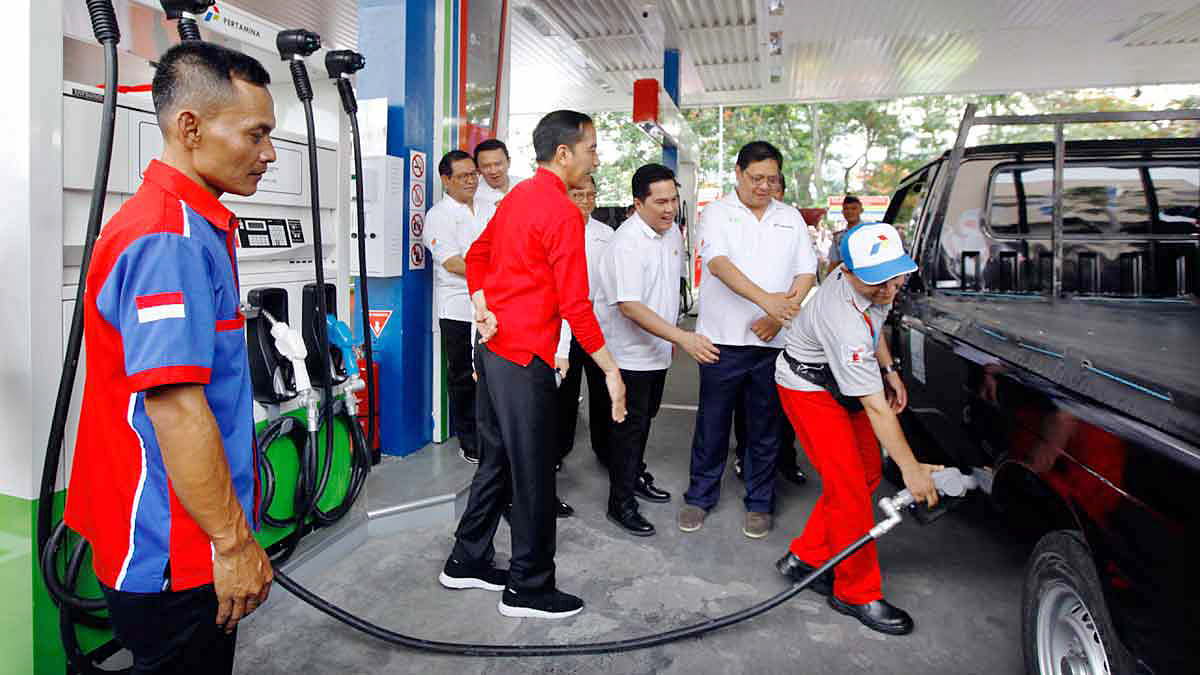
President Joko Widodo inaugurates the program of mandatory use of B30 at the Pertamina MT Haryono gas station, Jakarta, December 2019. TEMPO/Subekti
But the biodiesel quota in 2021 was even stranger. Jhonlin Agro Raya, a biodiesel factory owned by Andi Syamsuddin Arsyad alias Haji Isam, was given a quota of 19,675 kiloliters, although the biodiesel factory in Tanah Bambu, South Kalimantan, was only inaugurated by President Joko Widodo in October 2021. “The regulation allows a company to join midway,” said Dadan.
The regulation Dadan refers to is Energy Minister Regulation No. 24/2021, issued on August 6, 2021. Article 13 indeed accommodates changes in participating companies as well as biodiesel allocations. But the regulation also stresses that quota changes may occur when there is a failure in biodiesel shipment, if an appointed company does not operate, if there are changes in the demand for diesel, and changes in delivery points—not because a new biodiesel factory is in operation.
The basis for appointing Pertamina’s biodiesel suppliers, according to Dadan, is the supplying companies’ performance in the previous year. But based on the data, not all of these companies have performed well. Bayas Biofuels only managed to realize 62.1 percent of its promised supply in 2019. But, in 2020, it was given a biodiesel supply quota of 813,000 kiloliters, almost equal to its manufacturing capacity.
Dadan argues that in 2020 all companies were given quotas according to their capacities because the B30 program—30 percent palm oil, 70 percent diesel—had just been launched. “We whitewashed everything,” he said. “Because we needed 1.5 times more biodiesel compared to 2019.”
But the government regulation has not been able to detect the suspected quota-trading between biodiesel companies. Wilmar Nabati Indonesia is recorded to have sold FAME to Wilmar Bioenergi in the amount of 18,989 liters in 2020. When asked to confirm, M.P. Tumanggor said he was unaware of the issue. “What was paid was the amount supplied to Pertamina,” he said.
Tumanggor does not deny that some businesspeople helped determine B30 biodiesel subsidies because of their close relationships with government officials. He claims to have been well acquainted with government ministers since the time Sofyan Djalil chaired the BPDPKS steering committee, which was why he was able to bring Tolen Ketaren to Minister Airlangga Hartarto’s office, to ask the latter to sit on the Samade Association’s governing board. “Well, (we’re) somewhat close,” said Tumanggor.
This report is made possible through collaboration with Jikalahari, Greenpeace Indonesia, and the Auriga Nusantara Foundation, with the support of the Rainforest Investigations Network, Pulitzer Center.
INVESTIGATION TEAM
Team Leader: Bagja Hidayat
Project Head: Erwan Hermawan
Writers: Erwan Hermawan, Mahardika Satria Hadi
Designers: Rio Ari Seno
Photographers: Gunawan Wicaksono, Ratih Purnama Ningsih, Jati Mahatmaji
English Editor: Luke Edward
